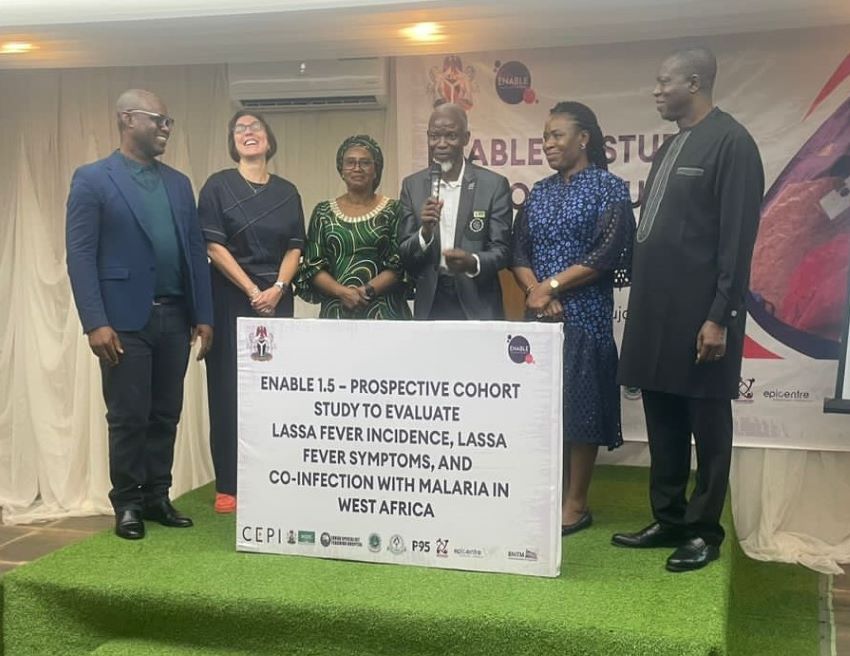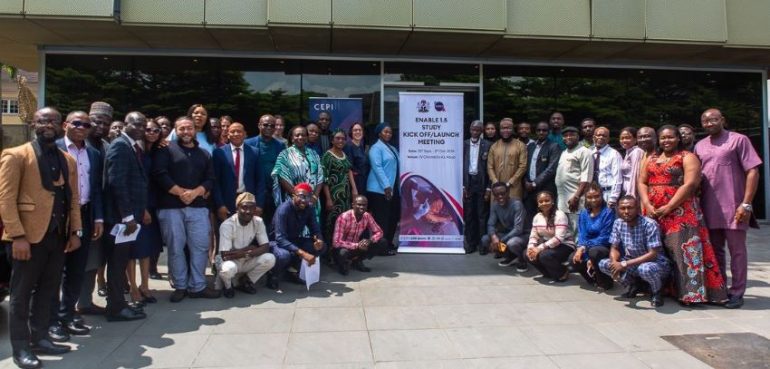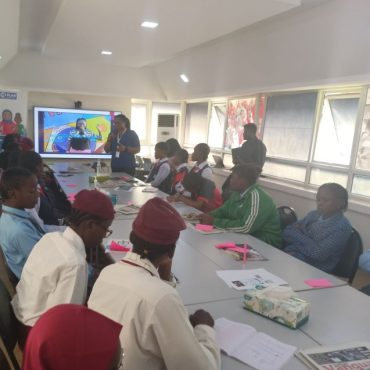Listeners:
Top listeners:
00:00
00:00
volume_up
chevron_left
-
play_arrow
Kapital FM 92.9 The Station that Rocks!
share
close

To Invite Five thousand Healthy People, Including Children And Infants In New Year-Long Study
Scientists in Nigeria are expanding their research into the deadly Lassa fever with the launch of a pioneering study designed to get a better idea of the variation in disease symptoms and how these compare to malaria and other worrisome infections found in the region.
The new research, led by the Nigeria Centre for Disease Control and local study sites, forms part of Enable, the world’s largest Lassa fever study.
Enable was created by the Coalition for Epidemic Preparedness Innovations (CEPI) and partners to provide a more accurate picture of the disease burden in West Africa and help inform outbreak preparedness efforts, including the development of a Lassa vaccine.
The Coordinating Minister of Health and Social Welfare, Dr Muhammad Ali Pate who noted that Lassa fever remains a public health burden in Nigeria and West Africa said the commitment to research and innovation was yielding promising progress.
 ” The new Enable research will deepen our understanding of the virus and enhance the work being undertaken to develop the first-ever Lassa vaccine to safeguard the health of our communities. The Federal Ministry of Health and Social Welfare remains committed to working alongside our partners and neighbouring nations to advance these efforts and bring the suffering caused by Lassa fever to an end.”
” The new Enable research will deepen our understanding of the virus and enhance the work being undertaken to develop the first-ever Lassa vaccine to safeguard the health of our communities. The Federal Ministry of Health and Social Welfare remains committed to working alongside our partners and neighbouring nations to advance these efforts and bring the suffering caused by Lassa fever to an end.”Five thousand healthy people, including children and infants, will be invited to take part in the new year-long study. The research will launch this month at sites in Nigeria (Edo, Ondo and Ebonyi states), as well as Sierra Leone and Liberia in later weeks.
While Lassa fever is a known public health burden in the region—with hundreds of thousands estimated to be infected each year—many cases are likely going unreported due to difficulties with Lassa case detection.
Most people infected with the Lassa virus are thought to be minimally symptomatic or asymptomatic and are therefore going under the radar. For those that do suffer with symptoms, like fever, headache and chills, they may be misdiagnosed with diseases like Ebola, dengue or malaria which can also first present with similar non-specific symptoms.
“Incomplete detection of Lassa fever cases not only impacts our understanding of the true incidence rate and therefore the level of resource needed to respond to the disease, but it could also threaten the evaluation, rollout and acceptance of future Lassa vaccines” explains Dr Richard Hatchett, CEO of CEPI.
The new research therefore aims to improve scientific understanding on how commonly Lassa fever occurs, how rates of infection and symptoms vary across selected locations, ages, sex and previous exposure to the virus, and the extent of post-infection symptoms like hearing loss. Scientists will also look at how often people may be co-infected with Lassa fever and malaria since co-infections may complicate the clinical course of each disease.
“Insights gained on the diversity of disease symptoms will enhance our understanding of Lassa fever, categorised into mild, moderate or severe cases” added Dr Richard Hatchett. “This information will be crucial in guiding where and how future late-stage vaccine trials are conducted and determining priority groups for receiving the Lassa vaccine once it becomes licensed in the coming years.”
A recent modelling study, led by the Universities of Oxford and Liverpool and the Liverpool School of Tropical Medicine and funded by CEPI, estimated that 3300 lives could be saved across the region over a ten-year period from the introduction of a Lassa vaccine. The most advanced Lassa vaccine candidate is currently undergoing Phase 2 trials in the region.
The Enable National Project Coordinator, Mrs Elsie Ilori, , said: “The launch of this expanded Lassa fever study is a key step in our ongoing efforts to understand and combat this dreadful disease.
”Through deeper investigations into the variations of Lassa fever symptoms and their comparison to other prevalent infections within the region, we will obtain valuable insights that can improve diagnosis, boost outbreak preparedness, and inform future vaccine development. This study will help us better understand how to reduce the Lassa fever burden in Nigeria and West Africa while saving lives and improving our health systems.”
On his part, the Director General of Nigeria Centre for Disease Control and co-chair of the Nigeria Lassa Vaccine Task Force, Dr Jide Idris, said: “This expanded investigation represents key progress in our battle against Lassa fever.
”We are improving our capacity to identify and recognize cases while preparing for future vaccine development by examining the disease’s symptoms and its connection to other infections. The results of this work are vital for forming health practices and promoting the health of populations in Nigeria and West Africa. Our global partners and local communities are assisting us in making strides towards lessening the impact of Lassa fever and getting ready for a future that can block its life-threatening effects.”
First formally diagnosed in Nigeria in 1969, Lassa fever is a potentially deadly disease primarily spread to people by infected Mastomys rats. While the majority of those infected are thought to be asymptomatic, it can lead to more serious symptoms, including in mother and baby if pregnant women become infected. On average 1% of cases are fatal. The World Health Organization has identified Lassa fever as a priority pathogen in urgent need of R&D.
CEPI first launched Enable in 2019. Over 23,000 participants across West Africa have taken part in the research to date, with initial data collected up to 2024 expected to published in upcoming months.
In addition to increasing knowledge of the disease and its case count across the region, Enable is advancing study site capabilities and helping them prepare for future epidemic and vaccine research, such as potentially supporting future Lassa vaccine trials.
PR
Written by: Modupe Aduloju
Rate it
Recent Posts
- NEPC, NDPC Partner To Safeguard Registered Exporters Data
- Plan International Nigeria Takes Step To Ensure Implementation Of Girls Rights
- Father Of Girl Who Drew Anti-War Picture Freed From Russia Jail
- UK Did Not Endorse Yoruba Nation Petition – FG
- FG Plans Cash Transfer For 20 Million Poor Nigerians
Recent Comments
No comments to show.-

Mellow Flight
With Mayowa Soname
From 10AM to 3PM on weekdays, allow us to be your sonic oasis, providing the perfect soundtrack to accompany your midday activities. Our seasoned hosts will be your cheerful companions, bringing you a vibrant blend of music, entertainment, and insightful content that will make your lunch break truly memorable.
close Top popular
Chart
-
-
play_arrow
Sunshine Tommy Blues
-
play_arrow
-
-
play_arrow
Red Frank Lee
-
play_arrow
-
-
play_arrow
Eclipse Donna May
-
play_arrow
-
Copyright Kapital FM 92.9 Abuja - The Station that Rocks!









Post comments (0)